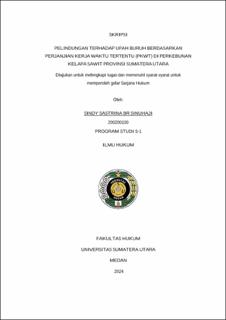| dc.contributor.advisor | Agusmidah, Agusmidah | |
| dc.contributor.advisor | Bukit, Andi Nova | |
| dc.contributor.author | Sinuhaji, Sindy Sastrina | |
| dc.date.accessioned | 2024-07-17T07:15:23Z | |
| dc.date.available | 2024-07-17T07:15:23Z | |
| dc.date.issued | 2024 | |
| dc.identifier.uri | https://repositori.usu.ac.id/handle/123456789/94497 | |
| dc.description.abstract | Palm oil is a plantation commodity that has a strategic role in Indonesia's economic development. Palm oil has experienced rapid growth over the past few decades, making Indonesia as one of the palm oil main producers in the world. Workers/employees see wages as a source of income to meet the living needs of Workers/Labourers and their families. Wages are one of the most sensitive aspects in the employment relationships. In this thesis researcher found 3 (three) problem formulations, namely: How are wages regulated in the Employment Law?, what is the wage system for workers working on oil palm plantations based on a Specific Time Work Agreement?, are workers' wages based on a Specific Time Work Agreement in oil palm plantations in accordance with the Labor Law? This research aims to analyze the protection of workers' wages based on PKWT in oil palm plantations.The type of research used is normative-empirical research. This research is descriptive research, namely legal research that is explanatory in nature and aims to obtain a complete picture of the legal situation that applies in a particular place, or regarding existing juridical symptoms, or certain legal events that occur in society. Researchers collected data using library and interview techniques.The results of the research show that wages for workers/workers based on PKWT do not show any discrimination because the provisions regarding wages and provincial minimum wages (UMP) and Regency/City minimum wages (UMK) are the same for all workers/laborers and do not differentiate between workers/laborers and PKWTT as well as workers/laborers with PKWT. Wages received by laborers/workers who work on oil palm plantations are adjusted to the minimum wage and receive social security. BHL workers who work on oil palm plantations do not meet the UMK because laborers/workers can only work less than 21 days in one month. BHL also does not receive social security as regulated in Indonesian regulations. | en_US |
| dc.language.iso | id | en_US |
| dc.publisher | Universitas Sumatera Utara | en_US |
| dc.subject | Legal Protection | en_US |
| dc.subject | Wages | en_US |
| dc.subject | Specific Time Work Agreement | en_US |
| dc.subject | SDGs | en_US |
| dc.title | Pelindungan Terhadap Upah Buruh Berdasarkan Perjanjian Kerja Waktu Tertentu (PKWT) di Perkebunan Kelapa Sawit Provinsi Sumatera Utara | en_US |
| dc.title.alternative | Protection of Labor Wages Based on Specific Time Work Agreements (PKWT) in Palm Oil Plantations in North Sumatra Province | en_US |
| dc.type | Thesis | en_US |
| dc.identifier.nim | NIM200200100 | |
| dc.identifier.nidn | NIDN0016087603 | |
| dc.identifier.nidn | NIDN0112078601 | |
| dc.identifier.kodeprodi | KODEPRODI74201#Ilmu Hukum | |
| dc.description.pages | 145 Pages | en_US |
| dc.description.type | Skripsi Sarjana | en_US |


